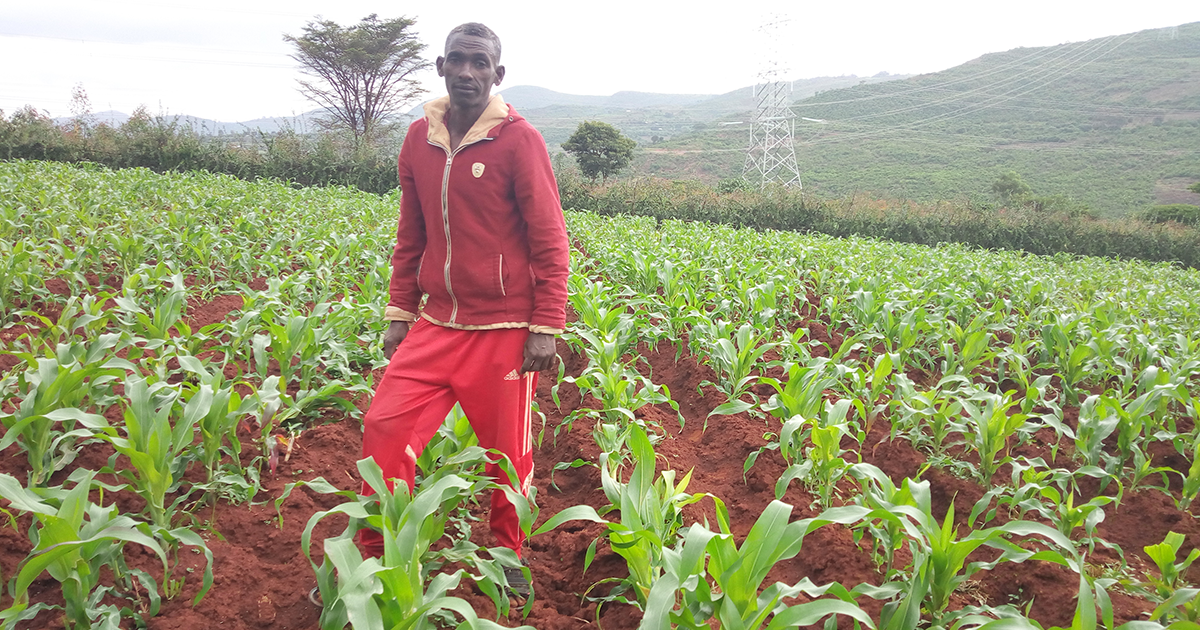To learn more about Digital Green’s AI-powered platform and how it impacts small-scale farmers in India, Ethiopia, Kenya, Nigeria and Brazil, we encourage you to sign up for our newsletter.
Fighting FAW With Video-Based Agriculture Extension

Ato Abraham Megersa is a farmer in Toke Kutaye woreda, West Shoa Zone of Oromia Region, Ethiopia. Born in 1978, he has 4 sisters and 2 brothers. Ato Abraham is a father of 5 children (3 daughters and 2 sons). Except one, all his children are going to school. Ato Abraham had to discontinue his schooling after 9th grade when his father passed away in 1994 and had to start working to support his family.
Farming and animal rearing are the main sources of income for Ato Abraham’s family who are subsistence farmers. The major crops grown on his 1.5 hectares are Teff, wheat, and maize. They have 15 domestic animals, including goats, cows etc. Apart from his own farmland, he rented another 2.5 ha of irrigation land in 2018-19. Four oxen and his family labor to till the land.
Ato Abraham had had very limited contact with the Development Agents (agricultural extension agents of the government) and had little knowledge about the existing government extension advisory services. Which resulted in a knowledge gap around package-of-practices such as row planting, optimum plant density planting, use of the recommended amount of fertilizer, UREA side-dressing, herbicide application, and spraying of pesticides to control insects like African ball worm and others.
“Ato Abraham attended a few video dissemination sessions in 2010. He planted 1 hectare of land with maize using the full package of practices, such as the use of improved seeds, row planting and the like. However, despite using the improved practices, the production was lower than ever before due to a severe attack by Fall Army Worm (FAW) in the region,” shared Solomon Bayisa, extension expert of Toke Kutaye woreda.
Observing the damaged crop, Solomon Bayisa suggested Ato Abraham attend video disseminations on FAW identification and management to effectively control the damage.
Ato Abraham attended a series of video dissemination sessions on identifying, scouting and managing FAW. He was able to scout and manage his maize crop from seedling to the silking stage. He picked up FAWs with his plastic gloved hands and put them all in plastic bags that gave no room to the FAWs to escape and put them in boiling water, killing the worms effectively and arresting further outbreak. Moreover, he was able to squash eggs beneath lower leaves, which range from 150 – 200 eggs/plant. Timeliness of these practices has helped him control the worm effectively before they could bore into the stem, where they are no longer visible and stay protected.
As a result, Ato Abraham was thankful to the DA for the video dissemination program that helped him protect his maize crop from this devastating new worm in his area. ‘’I have gotten the highest yield that has not been obtained in the area,” shared Ato Abraham during the interview. He added that “Learning gives power and wisdom to overcome problems.”
Ato Abraham planted maize seedlings on 1.5 ha of land as seen in the picture above. His crop stands impressively as compared to other fields in his area. This is a proxy indicator of highly improved productivity and production. Ato Abraham has understood the difference made by video-enabled learning. “I am committed to sharing the best practices with fellow farmers who have no opportunity to attend video screenings,” he added.